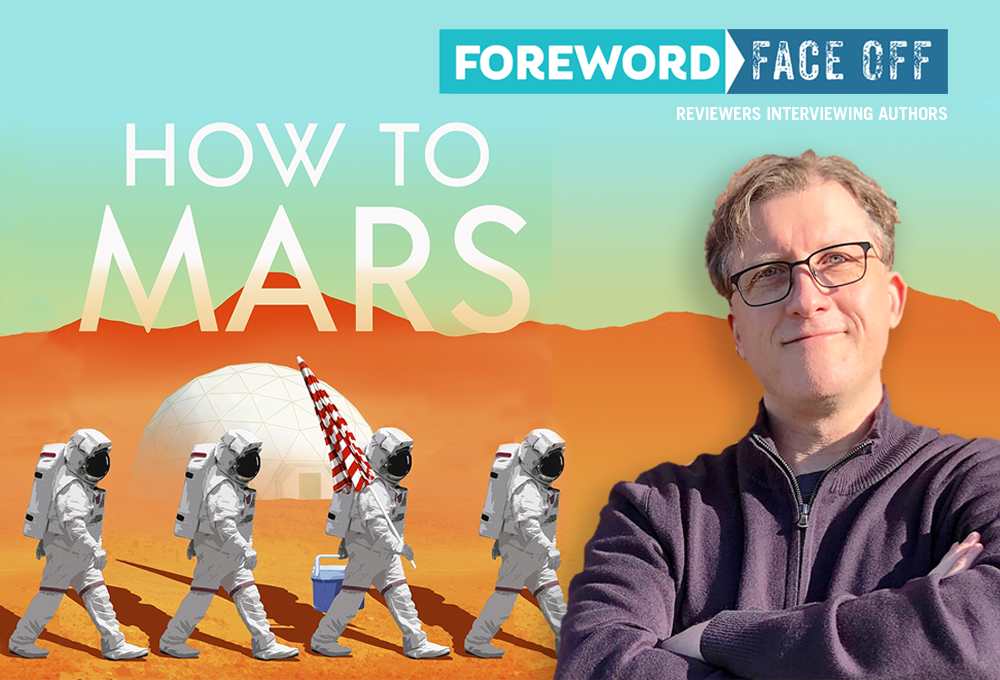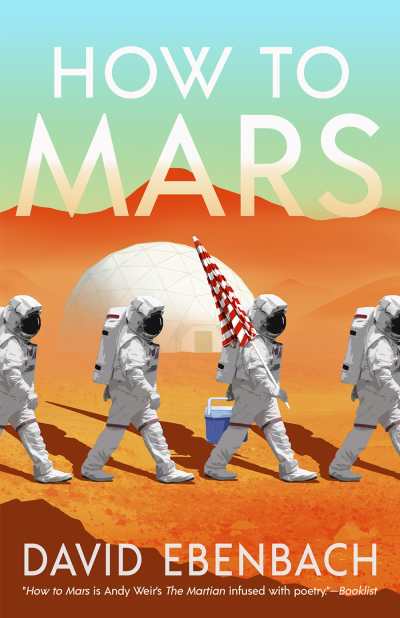Reviewer Michelle Anne Schingler Interviews David Ebenbach, Author of How to Mars

Unlike the government-funded, crew-cutted space programs of yore, you gotta love how eccentrics like Elon Musk and Jeff Bezos are putting their quirky signatures on SpaceX and Blue Origin, the two pet projects of their billionaire fancies. Gobs of money come in handy when you dream of reaching the stars and won’t take no for an answer.

Alas, the rest of us are left to our imaginations—but not all imaginations are created equal. This week, we’re psyched to eavesdrop on a fascinating conversation between our sci-fi-fanatic Editor-in-Chief Michelle Anne Schingler and David Ebenbach, newly crowned author of How to Mars. In her glowing review for Foreword’s May/June issue, Michelle calls the book “a raucous joyride across the red planet,” but one that is also “sly in raising issues of voyeurism, consumerism, and the unholy combination of moneyed interests with science.”
So, pour yourselves a big glass of Tang and get after it you two stargazers.
The real world corollary to Destination Mars! seems to be SpaceX, though it has less of a reality television bent. Should people be alarmed by the privatization of space exploration and other scientific endeavors? What are your concerns and intrigues there?
The original inspiration was Mars One, a company that (perhaps, fraudulently) proposed a mission very similar to the one that’s at the center of How to Mars—one-way mission, reality-show-funded, no-sex-allowed, etc. Totally bonkers, and I ran with that. But SpaceX is relevant too, in that the role of money in scientific endeavors always carries enormous risks. In order to attract money you have to be appealing, whether to consumers (if the mission is run by a business) or voters (if it’s being run by a government). And science is not inherently appealing—it can be a slog, slow and methodical—even when we’re talking about Mars exploration. Mars itself is not an incredibly appealing place, in fact; it’s frigid and barren and you can’t breathe there. So what do you have to do, and how much do you have to compromise your mission, to be appealing enough to attract that money?
When you were imagining your Marsonauts: what was the ideal balance between scientific qualification and telegenic qualities? Your technical engineer, for example, is a major grump, which seems like it would disqualify him from most reality programs—or does the fact that he could ruin everything on a whim make for the possibility of good TV? What do you imagine the selection committee was looking for, really?
Well, I figured that you did need some genuine expertise: medical doctors, engineers, pilots, scientists, and a psychologist to keep an eye on it all. That’s the foundation, so that people don’t just die off in space, and so that you can retain the veneer of science. But yeah—it’s got to be good TV, too. So I think Destination Mars! wanted the potential for drama, and Stefan clearly had a short fuse before he ever left Earth. And I suspect they liked the fact that Trixie was loud and gregarious, and that Jenny and Josh had issues that they were bringing with them, and so on. I guess that would be the formula for a reckless and eccentric organization who wanted to send folks to Mars and film it for television: sensible enough to keep the Marsonauts alive, and dramatic enough to keep viewers watching.
In that same vein: suggesting that the Marsonauts undergo tubal ligations and vasectomies because babies on Mars would be disastrous, but not insisting on it, felt like too obvious of an oversight on the part of the meticulous Destination Mars! organizers—like giving a Real Housewife a bottle of wine, whispering a rumor into her ear, then turning the camera on. Were some of the preventable disasters the Marsonauts encountered intentional, with ratings in mind?
I have to think that Mars One, my inspiration, knew that their no-sex-on-Mars rule was ridiculous. Unenforceable and vanishingly unlikely. How can you clump a handful of people together in unimaginable circumstances far from the rest of humanity for the rest of their lives and expect that they’ll follow agreements—especially about sex—that they signed way back on Earth? It seems impossible to me, and Mars One had to know it. By extension, so did Destination Mars! Though I don’t think they’d ever admit it.
I absolutely loved that one of Josh’s early reactions to finding out that he was going to be a father was to ask Jenny about raising their child as a Jew on Mars. But ours is a very community-centered religion, which made me wonder: what would Judaism on Mars look like? How would one observe Shabbat there, for example (to say nothing of minyanim)?
You know, our minds are going to pretty similar places. I’ve actually got a blog post called “Judaism in Space” coming out sometime soon on the Jewish Book Council’s blog, The Paper Brigade Daily. In that piece I talk about how Judaism is a really time-bound and place-bound religion, with certain holidays tied to certain seasons and lots of emphasis on sundowns and all of us facing Jerusalem during certain prayers, and I ask what we would do if we were cut loose from Earth’s patterns and places. It’s a head-scratcher, for sure.
But you raise a different question that I love, which is about the community. As the saying goes, “you can’t be a Jew alone.” And yet there’s Josh, the only Jewish person on the planet. What does it even mean to be Jewish under those conditions? Well, I think it’s significant that he only really starts to think about it when a kid’s coming, because that means the community is growing. That new kid, if the parents decide to encourage it, has the potential to make Judaism plural on Mars.
If you’re curious, I deal with these questions a bit in my short story “What Lights We Have,” a quasi-sequel to How to Mars. But the short answer, I think, is that Judaism has been through enormous change before—I mean, our ancestors practiced their religion by sacrificing animals at a single central Temple. And we adapted, focusing on ways to preserve what mattered most to us, and we survived. And we may well need to do it again.
Speaking of religion and the divine: the organizers of Destination Mars!, and certainly the person who wrote the handbook, skirt self-deification at times. Is the suggestion that a person has to be a little egomaniacal, or at least a little grandiose, to undertake a project like colonizing another world? Can that be done without suggestions like “maybe I could be your god”?
I am so glad you spotted that. Not many people have! For me, the book is a very loose allegory for the Garden of Eden story, where humans are kicked out of paradise and have to make their way on their own. (Of course, like Jenny and Josh, the first notable thing they do is make a child.) And so, in that allegory, Destination Mars! is in the G-d role.
And it’s a natural fit, right? I think you’re absolutely right that you have to have an outsize sense of your own power and wisdom in order to pursue a mission to send people to another planet. It’s not the kind of thing that would occur to a regular person to take on. (All I did was write a novel about it and that left me pretty tuckered out.)
Which raises a question for anyone considering volunteering for a mission of this kind: just how much should you trust a person with an ego like that?
Your Martians were fascinating and surprising beings. I’m very glad that coexistence proved possible, even if that was somewhat because humans, to them, were determined to be acceptable curiosities. How do you imagine the human/Martian relationships might evolve into the Marsonauts’ future? And what are the real time lessons there for people as we presume to set foot on other planets?
I’ve been thinking a good bit about this; part of me would like to return to the world of How to Mars and write my way into a true sequel. For the moment, that’s just a notion, and it may never happen, but I think I’d have to write that to really know where things are going. Still—I have a sense that there’s a basis for a lasting peace, and maybe both species can grow and become something new, but you never know. The humans and the Martians are so different that it’s easy to imagine them provoking each other without even meaning to.
This is your first science fiction novel. How did the transition between genres go for you, and would you stay in this realm for another title?
You know, for a long time I didn’t even realize I was writing science fiction. In my mind, I was just doing my usual thing, writing about relationships and human experience, and I was doing that on Mars only because it seemed to me that (after reading about the Mars One idea) that was a really interesting place to explore relationships and human experience. But yeah—now I get that it’s science fiction. Rockets, aliens, other planets.
And I do like the freedom that sci-fi gives me to step beyond ordinary reality to create really unusual situations, because unusual situations let me look at people in new ways. In the past—in particular, in my book The Guy We Didn’t Invite to the Orgy and other Stories—I’ve done the same thing with magic realism.
But, whatever the genre, my concerns are always the same: What’s it like to be alive? What’s it like to be in relationships with other people? What (inside us and outside us) makes us stumble, and what (inside us and outside us) lifts us up?
Michelle Anne Schingler
